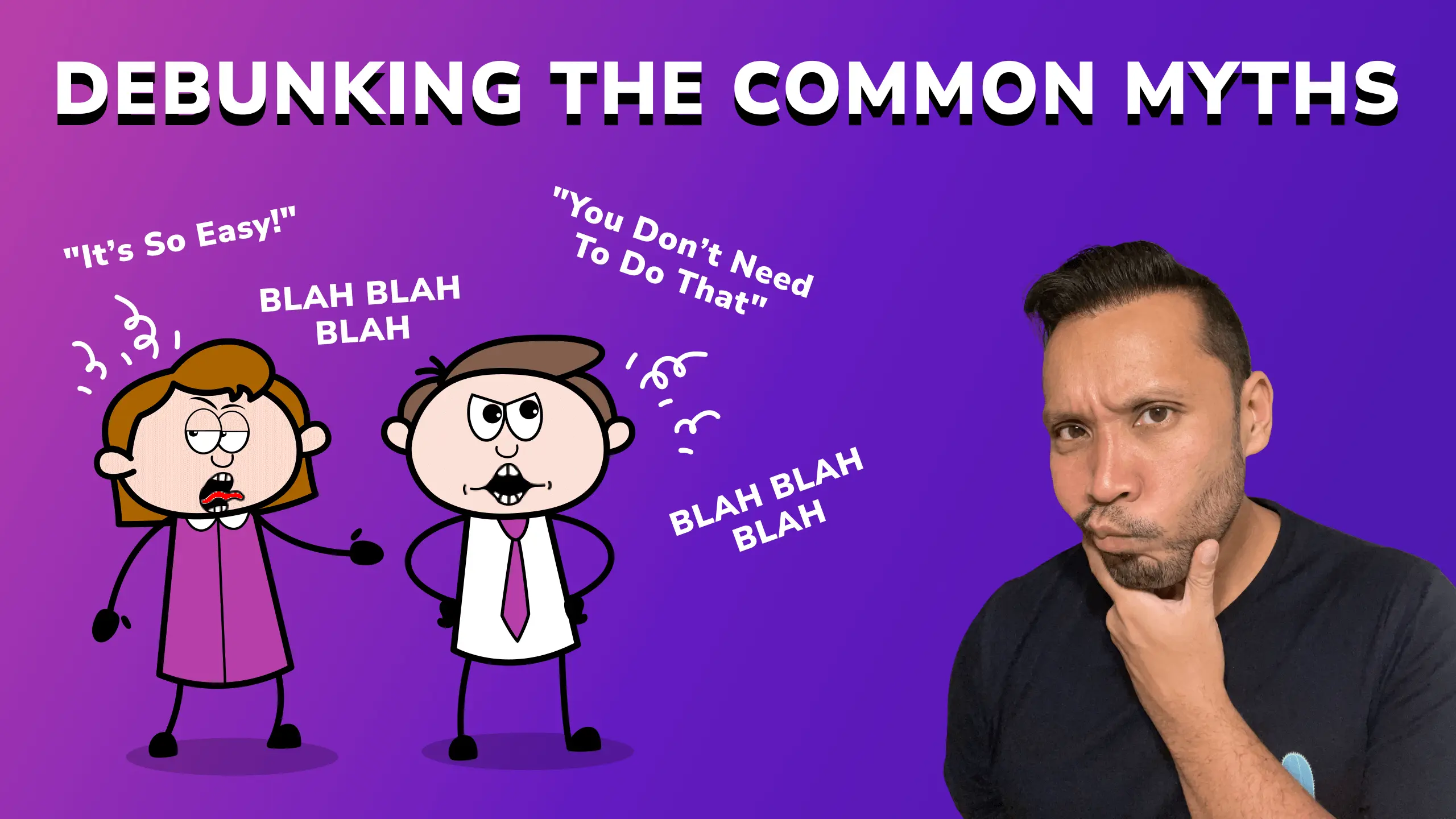Top 8 Common Myths About Websites for Businesses
Dec 5, 2024
Let's get real for a moment. Your website isn't just another checkbox on your business to-do list—it's your digital platform for your business, your 24/7 brand ambassador and your best salesperson working overtime while you sleep. But here's the thing: most small business owners are accidentally sabotaging their online potential without even realizing it.
Picture this: You've poured your heart and soul into your business. You've perfected your craft, created amazing products or services, and you're ready to conquer the world. But instead of attracting clients like a magnet, your online presence is about as exciting as watching paint dry. Ouch.. yes, that truth is hard to swallow!
But I’m here to help you with this. I’ll dive into the 8 most common myths that are holding you back from making your website become one of your biggest assets for your business. By the end of this, you'll be armed with the knowledge to make your website go from being a bit “meh" to that makes you say “oh wow!”.
Myth 1: I Don't Really Need a Website
Let's break this down brutally honestly: If you're not online, you might as well be invisible. I know it’s harsh, right? But in today's digital world, not having a website is like opening a restaurant but telling no one about its location.
Think about how you find businesses these days. Need a graphic designer? You Google it. Looking for a local consultant? You're checking their online presence. Potential clients are doing the exact same thing when they're searching for YOUR services. In fact, I’ve conducted a focus group with my clients and close peers asking what their thoughts would be if they were introduced to a consultant/contractor that didn’t have a website. The general consensus is that they would see that consultant/contractor to be less professional because they didn’t invest into a digital platform. And no, I’m not talking about just having a Facebook/Instagram Business Page (I’ll get to that later!).
Your website isn't just a digital business card—it's your opportunity to tell your story, showcase your expertise and build trust before you even have a conversation. It's your chance to demonstrate why someone should choose YOU over every other option out there.
Practical tips to make your website work. Firstly, actually have a website LOL! Once you have one, then consider the following:
Clearly explain what makes you unique
Share real results and success stories
Make it stupid-easy for people to contact you
Update your content regularly to show you're active
Create resources that provide genuine value
Myth 2: I Can Create My Website and Forget About It
Oh boy have I’ve seen this done way too many times. Your website is just like your business. You can’t expect to start a business and watch it magically grow itself. Consider your business and your website as a living, breathing entity—not a dusty old photo album you shove in a drawer and forget about.
The digital landscape changes faster than fashion trends. What worked last year might be completely outdated today. Search engines love fresh, relevant content. They're like that friend who always wants to know what's new and exciting.
Treating your website like a set-it-and-forget-it project is basically telling potential clients, "I don't really care about staying current or providing value." Not exactly the message you want to send, right?
Smart website maintenance strategies:
Schedule quarterly content reviews
Keep your portfolio or case studies current
Share industry insights and recent projects
Check and update technical elements like loading speed
Ensure all links and contact information work perfectly
Myth 3: My Social Media Page Works Just Fine
Here's a reality check: Building your entire online presence on social media is like building a house on rented land. Instagram, Facebook, LinkedIn—they can change their rules or algorithms overnight, and suddenly your carefully curated audience vanishes.
Social media should be your wingman, not your entire dating strategy. Your website is the main event—the place where you have total control over your narrative, design and user experience.
Think of social media as appetizers that lead people to the main course: your website. That is, use these platforms to tease, to intrigue, to make people curious enough to click through and learn more about what you offer.
Some suggestions for a social media success blueprint:
Create platform-specific content that hints at deeper resources
Use social channels to drive traffic to your website
Develop lead magnets that capture email addresses
Maintain consistent branding across all platforms
Track which channels bring the most website visitors
Myth 4: Looking Good is All That Matters
Let's get something straight: A pretty website that doesn't work is like a sports car with no engine. Even though a lot of people are drawn to pretty aesthetics, looks aren't everything.
User experience is the real star of the show. Importantly, your website has to be clear with the messaging and the content. Clearly explain what you, what problems you solve and who you serve. It also needs to be fast, intuitive, and mobile-friendly. Visitors should be able to find what they need within seconds. If they have to click more than twice or wait for pages to load, they're gone—probably straight to your competitor.
Design isn't just about looking cool. It's about guiding your visitors exactly where you want them to go. Every single design element should have a strategic purpose.
Here are some tips on providing a great user experience for our website visitors:
Test website speed to make sure it doesn’t load a snail pace
Ensure your website looks great on tablet and mobile
Make sure the website content is clear and you have an intuitive navigation
Use visual cues that guide attention
And last but not least, make sure all call-to-action buttons CANNOT be missed
Myth 5: I Can Build My Own Website for Free
Free website builders might seem tempting, but they're basically the fast food of web design—quick, cheap, and ultimately unsatisfying.
A generic website built from a template screams "I didn't invest in my own business." And yes, most people can tell straight away if you were cheap. Professional clients want to see that you take your brand seriously. A custom-designed website signals quality, attention to detail and professionalism.
Think of web design as an investment, not an expense. It's your digital first impression—So make it count!
Here are some website investment tips:
Budget for professional design
Choose designers with industry experience
Prioritize functionality over pure aesthetics
Consider phased approaches for budget management
You don’t need to invest an arm and a leg for your website. If you do decide to hire a professional, make sure you are comfortable with the value they provide to you and your business.
Myth 6: People Will Find Me Easily Online
OK, newsflash…. The internet is massive and the content on the WWW is a bit over-saturated. Simply existing online doesn't guarantee visibility and it’s very important to take proactive steps to stand out from the rest.
Digital marketing is your ally in this regard and it isn't a one-and-done task. It's an ongoing strategy that requires consistent effort across multiple channels. You need to be strategic, consistent and genuinely valuable.
Here is a suggested visibility game plan:
Develop targeted content marketing
Implement advanced SEO techniques
Create shareable, valuable resources
Engage in professional online communities
Consider using strategic paid advertising
Consider using email marketing
Myth 7: I'll Show Up on Google Automatically
Search engine optimization (SEO) rankings aren't participation trophies. They're earned through strategic and consistent effort.
SEO is a complex dance of quality content, technical optimization, and ongoing adaptation. It's not about tricking search engines—it's about providing genuine value that they recognize and reward.
Some SEO tips:
Conduct comprehensive keyword research
Create in-depth, value-driven content
Optimize technical SEO elements
Build high-quality, relevant backlinks
Stay updated on algorithm changes
Implement schema markup
Develop a long-term content strategy
Myth 8: My Website Will Instantly Bring Customers
Let's set realistic expectations: Online success is a marathon, not a sprint.
Building credibility, attracting ideal clients, and establishing thought leadership takes time, patience, and consistent refinement. Your website is a long-term strategic asset, not a magic wand.
Here’s a sustainable growth roadmap:
Set realistic, measurable goals
Track performance metrics
Continuously refine your approach
Invest in skill development
Build genuine industry relationships
Create a content ecosystem
Stay adaptable and open to evolution
Final Thoughts
Your website isn't just a digital business card—it's your most powerful tool for connection, credibility and growth. By understanding and busting these myths, you're not just creating a website. You're building a digital powerhouse that truly represents your unique value.
The online world rewards those who are strategic, consistent and genuinely committed to serving their audience. Your digital journey starts now.
Let's make some magic happen!



